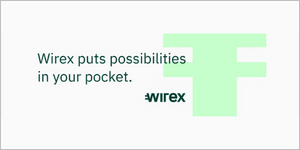
Top Crypto Debit Card for Rewards
Wirex: It pays out up to 8% cash back on purchases, and has one of the largest selections of cryptocurrencies as well.
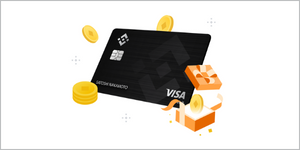
Top Crypto Debit Card for Europeans
Binance: It’s no surprise to find that the largest global crypto exchange offers the best crypto debit card for European users.
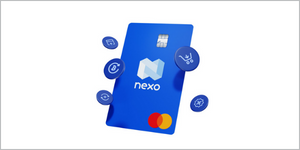
Top Crypto Debit Card for Low Fees
Nexo: With no monthly, annual, or inactivity fees it’s hard to beat the Nexo crypto debit card.
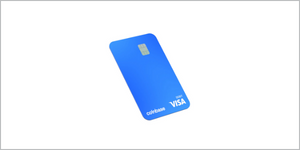
What’s the Best Crypto Debit Card Overall
Coinbase: They did away with fees and they support the largest number of crypto tokens. Add unlimited 4% cashback and it’s our top pick.
Crypto debit cards (sometimes called bitcoin debit cards) allow you to spend your crypto assets in the real world, just like a standard debit card.
These cards work in one of two ways:
- They link to a crypto wallet or online account where you hold your bitcoin or other crypto assets (like the Coinbase card);
- They convert your fiat to their own token that’s held on the card until you use it for payment (like the Crypto.com card).
When you use either type of card to make a purchase, your crypto is converted to fiat currency before the merchant processes it.
These debit cards let you easily spend your crypto assets, just like cash. Unlike crypto credit cards, you are not spending money you don’t have: think of these like a prepaid card or gift card, but loaded up with crypto instead of cash.
In this piece, we’ll show you our picks for the best crypto debit cards of 2023.
| Card | Description | Fees | Crypto Support | Rewards |
| Wirex | Debit card supporting cryptocurrencies and fiat currencies | No monthly fees. 1% fee for funding | Supports over 150 currencies, including 41 cryptocurrencies | Up to 8% cashback (paid in X-Points, a unit of Wirex loyalty points.) |
| Binance | European crypto debit card | No ATM withdrawal fee. No annual fee. No foreign exchange fee. | Supports 15 cryptocurrencies | 8% cashback paid in BNB tokens |
| Nexo | Visa-based debit card | No monthly, annual, or inactive fees | Supports 20 cryptocurrencies | 0.5% cashback as BTC or 2% as Nexo Tokens. |
| Coinbase | Visa-backed cryptocurrency debit card | No fees | Supports 230 cryptocurrencies | Unlimited rewards up to 4% |
| BlockCard | Virtual or physical debit card backed by Visa | $5 monthly fee (waived if $750 in crypto spent). Various ATM withdrawal fees | Supports 13 currencies, including bitcoin (BTC) and Ethereum (ETH) | Up to 6% cashback (paid in TERN) |
| Bitpay | Bitpay prepaid Mastercard | $2.50 for ATM withdrawals | 14, including BTC and ETH | Cashback offers are powered by Dosh and change over time. |
| Crypto.com | Visa prepaid card | No annual fees. $2.50 ATM fees | 90 different cryptocurrencies | Cashback (up to 5%, depending on card tier) |
| FTX | Visa-backed cryptocurrency debit card | No monthly, annual, or inactive fees | Supports all cryptos available on FTX | N/A |
 Wirex
Wirex
Wirex is a UK-based company offering crypto debit cards for personal and business use. The company provides you with a contactless card, and an app to manage it.
Wirex’s main product, the Wirex Visa card, allows you to convert fiat currencies into cryptocurrency and use it at locations accepting contactless payments.
The card provides generous rewards, and many consider it among the best for consumer perks, like Wirex X-tras, which gives up to 2% crypto cashback, a 12% savings bonus on the balance of your WXT account, and access to exclusive merchant offers.
The Wirex debit card has additional benefits, including a wide range of cryptocurrencies and free or low fees, like free ATM withdrawals up to about $250 per month, then 2% thereafter.
To get started, register, verify your account, add funds, and order a Wirex card online or via the app.
Pros:
- Fees: No monthly maintenance fees. 1% account funding fee.
- Cashback rewards.
- 25 crypto assets supported.
- Availability: Widely available globally.
- Easy to use.
Cons:
- Limited availability worldwide.
- You need Wirex tokens to get the best rewards. Wirex tokens are the company’s cryptocurrency and they give customers to crypto rewards as well as access to Wirex’s DeFi ecosystem.new generation of decentralised finance
Conclusion: The Wirex debit card is good for customers that want a low fee card and easy access to a wide range of currencies and fiat.
 Binance Debit Card
Binance Debit Card
Binance is the largest cryptocurrency exchange worldwide; the company launched its own crypto debit card in 2020 to generally favorable reviews.
The card is available in physical and virtual form for both offline and online spending. Its low monthly fees and high cashback levels make it a favorite among European consumers.
If you’re a Binance customer, you can order their card from your Binance account, or use the “Card” link at the bottom of the Binance page.
Once you add funding from Binance’s “Spot” wallet and transfer it to the “funding” wallet, you can start spending.
Pros
- Cashback for every purchase. Amount depends on your card level and the amount of BNB in your account.
- Cost-effective.
- No fees.
- Crypto remains in your funding wallet at Binance. No need to load the card.
Cons
- Limited availability (Europe only).
- Need to have large volumes of money in your account to reach the highest cashback levels.
- Transaction fees up to 9%.
Conclusion: The Binance debit card is good for European customers that want high levels of cashback.
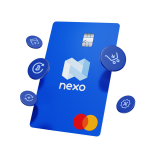 Nexo Debit Card
Nexo Debit Card
The Nexo Card is provided by Nexo, a crypto lending service that has grown into a large ecosystem that comprises exchange operations and a proprietary wallet and card. The card can be managed conveniently from the Nexo Wallet App.
Unlike other debit cards, there is no need to load the Nexo card. Instead it uses a line of credit linked to your held cryptocurrencies. You can opt for APR repayments as low as 0%, or increase your line of credit with rates that can go as high as 13.9%. The line of credit functionality means that, unlike credit cards, there are no minimum monthly payments.
Nexo users can pay with the Visa-based card at over 40 million merchants worldwide. In addition, it supports up to 20 cryptocurrencies, including bitcoin, Ethereum, and NEXO (the platform’s native token).
The great thing about the card is that it has no annual or inactivity fees. The cashback on all purchases is as high as 2%. You have to download the app and order the card to get started.
Pros:
- There is no annual or inactivity fee.
- Multiple digital currencies are supported.
- The card is part of Nexo, a crypto lending service that enables users to earn generous interest.
Cons:
- It can be used only by those who are part of the Nexo ecosystem.
Conclusion: The Nexo card is available in most countries. It gives users access to a crypto lending ecosystem that provides cashback benefits with no annual fees.
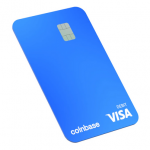 Coinbase Debit Card
Coinbase Debit Card
Brian Armstrong and Fred Ehrsam founded Coinbase on June 1, 2012, and since then, it’s grown to become one of the world’s largest and most respected crypto companies. (See our piece on How to Invest in Coinbase.)
The company’s crypto debit card allows cardholders to spend cryptocurrencies like bitcoin (BTC) and Ethereum (ETH) anywhere Visa debit cards are accepted, at 40M+ merchants worldwide.
The debit card links to your Coinbase account, and all withdrawals come from there. To get started, you just need to open a Coinbase account or download the app, load it up with crypto, then request a debit card.
Pros:
- World-class security from a trusted crypto exchange.
- Contactless payments.
- Rewards and cashback.
- 230 crypto assets supported.
- No fees.
Cons:
- Users need a Coinbase account.
- KYC required.
Conclusion: The Coinbase debit card is good for customers who need a user-friendly option, backed by the leading U.S. crypto exchange.
 Blockcard Debit Card
Blockcard Debit Card
Introduced by technology company Ternio, Blockcard offers virtual or physical debit cards and integrates with Apple, Google, and Samsung Pay.
You must register, make a deposit, complete the Know Your Customer check, and fund your account to get started.
When adding funds to a card in one of the 13 supported cryptocurrencies, they convert into Ternio tokens (TERN). These TERN tokens can be staked to increase your cashback rewards up to 6% (145,000 TERN staked). This is different from other debit cards, which let you hold your crypto assets in, say, bitcoin or Ethereum until you’re ready to spend. Understand TERN’s price history before you invest.
Pros:
- Supports cryptos like Bitcoin, Ethereum and Litecoin, as well as fiat currencies like USD.
- Cashback rewards.
- 13 cryptocurrencies supported.
Cons:
- You must convert your crypto to Ternio tokens, which have historically not been stable in value.
- A monthly $5 fee and transaction fees.
- Available in the United States only.
Conclusion: The Blockcard debit card is good for U.S. customers that want flexibility; be careful of converting your crypto value into TERN for the long term.
 BitPay Debit Card
BitPay Debit Card
BitPay is an American company that provides bitcoin merchant processing services. It also offers bitcoin payment processing solutions to businesses.
Its crypto debit card links to your wallet through the BitPay app. You can then top up your crypto debit card via the app to convert your crypto and start spending. You can also top up the card from your Coinbase account.
To get started, download the app, set up the wallet, and order your debit card.
Pros:
- No exchange or conversion fees in the U.S.
- No annual fees. $2.50 ATM withdrawal fees apply.
- High ATM withdrawal levels.
- No withdrawal limits.
Cons:
- Limited to the United States.
- Deposited crypto is exchanged for USD and cannot be converted back.
- Only 14 cryptos supported.
Conclusion: The Bitpay debit card is good for U.S. residents who don’t want to pay for exchange fees and are happy with a limited range of cryptocurrencies.
 Crypto.com Debit Card
Crypto.com Debit Card
Crypto.com is a Hong Kong-based crypto exchange platform specializing in providing bitcoin debit cards, cryptocurrency wallets, and other related products.
The crypto debit card uses Crypto.com’s CRO currency. Funds added to the card are converted to CRO, and CRO must be staked to earn cashback rewards – which are also paid out in CRO. Be sure you research CRO before investing in this token; because Crypto.com has aggressively marketed its brand, the price is volatile.
The card allows you to spend your cryptocurrencies anywhere in the world that Visa is accepted.
Pros:
- Top up with crypto and fiat currencies.
- No annual fees.
- Over 90 cryptocurrencies available.
- Cashback rewards.
Cons:
Conclusion: The Crypto.com debit card is good for customers that want access to a wide range of cryptocurrencies and a choice of cards with various rewards.
 FTX Debit Card
FTX Debit Card
FTX is a cryptocurrency exchange that launched its Visa-powered debit card at the beginning of 2022. It allows users to spend crypto at all merchants that accept Visa. The card is connected with the FTX account, with the balance being automatically exchanged at the point of sale.
This means you can spend any crypto assets in your FTX account, not just bitcoin or Ethereum. Currently the card is only available to US residents who meet the qualifications, which include a soft credit check and passing their KYC Level 2.
On the bright side, FTX doesn’t charge any maintenance fees for its card.
Pros:
- No annual fee.
- The Visa-powered card supports multiple cryptocurrencies.
Cons:
- US only.
- May be difficult to obtain.
- No reward points.
Conclusion: FTX is a Visa-based card, which means it can be used to pay at more than 50 million merchants. It can withdrawn directly from your FTX account, making FTX both a crypto exchange and a digital bank.
| Pros of Crypto Debit Cards | Cons of Crypto Debit Cards |
| You can spend digital currencies such as stablecoins. | Card providers may charge maintenance fees and other commissions. |
| Many crypto debit cards provide generous cash-back rewards. | Holding funds with your crypto debit card provider is generally less secure than storing cryptocurrency on a hardware wallet. |
| The foreign conversion fees are generally low. | Cryptocurrencies are highly volatile, so be aware of how your debit card funds are stored. |
Crypto Debit Cards: Smart Consumer Tips
Just as people use credit cards for everyday purchases to earn reward points (travel rewards, cashback rewards, etc.), crypto investors can use crypto debit cards to earn rewards.
The challenge is avoiding fees: in addition to the fees of transferring your fiat into crypto (the “on-ramp”), think about the fees of opening the card, loading the card, and using the card (the “off-ramp”).
Before opening any crypto debit card, do a back-of-the-envelope calculation to figure out your average monthly spend, and all the fees that will be associated with it – be sure the rewards outweigh the fees.
Additionally, there are crypto debit cards that pull directly from your account (like the FTX card), and crypto debit cards that convert your crypto into their own native token.
Smart investors will avoid changing their crypto into a third-party token that can fluctuate in value, unless they want to use it immediately, and the rewards outweigh the risk.
For more smart crypto investing tips, don’t forget to sign up for our free crypto investing newsletter.












More Stories
U.S. Congressmen Seek Information Over Govt’s Crypto De-bank Efforts
Is It Worth Trading in Forex Markets in 2023?
Ethereum Outshines Bitcoin As Enthusiasm Grows